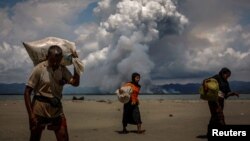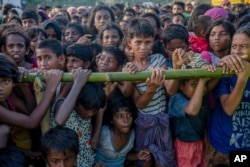A United Nations' expert on Myanmar urged Bangladesh on Tuesday to "shelve plans" to begin repatriating Rohingya refugees to Myanmar's Rakhine state this month to avoid persecution.
Nearly three-quarters of a million of Myanmar's Rohingya fled Rakhine state in August 2017 after a military crackdown. Amid refugee and journalist accounts of widespread killings and rape and the torching of villages, the Rohingya settled in crowded camps in neighboring Bangladesh.
The two countries agreed on Oct. 30 to begin returning Rohingya refugees to Rakhine state by mid-November, but U.N. rapporteur on human rights in Myanmar, Yanghee Lee, said the time is not right for their return.
"The Myanmar government has failed to provide guarantees they would not suffer the same persecution and horrific violence over again," Lee said in a statement. Lee added that the underlying causes of the crisis must first be addressed, including the right of citizenship.
Lee's warning followed a Facebook admission Monday that the social media network played a role in the genocide against the Rohingya people.
Last August, U.N. investigators accused Facebook of being "slow and ineffective" in tackling how it was being used to spread hatred among the country's Buddhist population against the minority Muslim Rohingya. In doing so, it "contributed to the commission of atrocity crimes," investigators said.
The report concludes Facebook was not doing enough to help prevent the platform from being used to foment division and incite offline violence, according to Product Policy Manager Alex Warofka, who wrote on the company's blog.
The report recommends Facebook create a rigorously enforced human-rights policy while clamping down on hate speech, as well as working to improve digital literacy, and the accuracy of the company's content in Myanmar.

